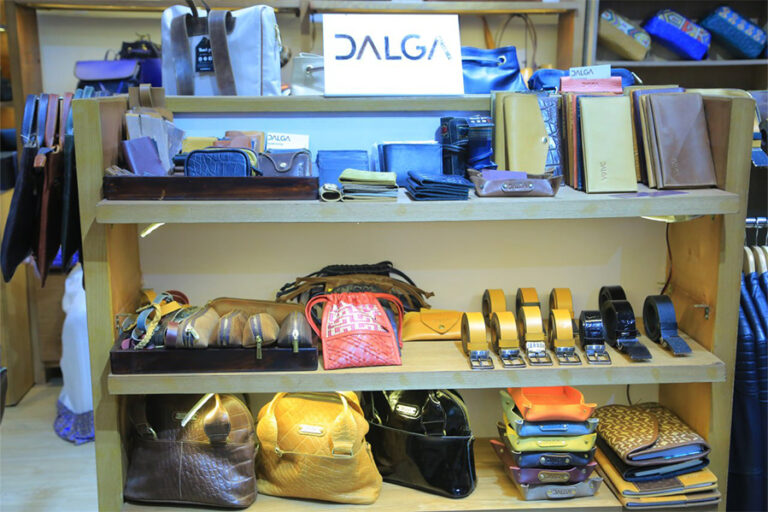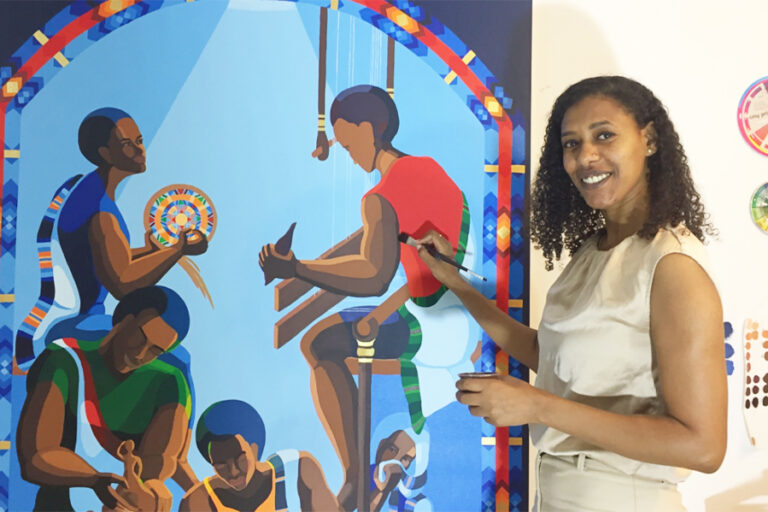Ethio Telecom’s telebirr proves instrumental in paying dues as the telecommunications firm begins implementing telebirr based tax payment system to enable category A and B federal tax payers in collaboration with the revenue ministry.
On Thursday September 1, 2022 Ethio Telecom signed an agreement with the Federal Documents Authentication and Registration Agency (DARA) to implement telebirr based service payments to enable customers of the agency to utilize telebirr payment systems in order to settle their service payments.
“This partnership agreement will modernize the existing working system of the agency and will enable its customers to settle their service payment using the telebirr digital payment system which is an easy, fast, and convenient and secure payment platform,” said Frehiwot Tamiru, CEO of Ethio Telecom.
Speaking at the ceremony, Muluken Amare, director of the agency, emphasized that these system will decrease frauds and mismanagement, “We have been working for the last 4 years to digitize our system and this agreement will help us to achieve our target.”
Consequently, the customers can easily settle service charges via telebirr mobile App or USSD (*127#) for authentication services like vehicle sale, donation, power of attorney, rental and loan agreement, memorandum of association and other similar services using the payment reference number they receive from the agency.
Federal Documents Authentication and Registration Agency has 15 branch offices and has been providing 27 different types of services as well as serve more than 7,000 customers and over 6.5-million-birr transaction is made per day.
“Ethio Telecom is working to simplify national payment system, and soon telebirr will start providing payment service for category A and B tax payers. We are also working to facilitate the system with the revenue ministry,” said Biruk Adhana, head of telebirr at Ethio Telecom, adding, “Ethio Telecom is further working with the Ministry of Innovation and Ministry of Trade to facilitate a telebirr based E-service.”
Telebirr has now more than 23 million customers. Recently, the company in partnership with Dashen Bank has launched three types of financial services namely telebirr mela (micro credit) a service that allows individual customers, agents and merchants to borrow money for any transaction or withdrawal and telebirr endekise (credit pay/overdraft service) a service that enables customers to borrow money when they are short of balance in their telebirr account while making transaction and telebirr sanduq (Micro Saving service) a saving service which is available with interest free and interest rate based micro saving services with a theme of finance for all to ensure financial services inclusion and accessibility to our wider society.
Tele curves new pathway for settling dues, through tele birr
Local leather goods to capture int’l eye at Bole airport
Ethiopian leather goods visibility receives a boost to the international eye as leather products are handed booths at one of the busiest terminals in Africa, Bole International Airport.
Through the initiative of the Ethiopian Leather Industries Association (ELIA) and the Leather and Leather Products Industry and Research Development Centre, local leather goods manufacturers have got the chance to promote Ethiopian products that has become popular in African markets, as it continues to be exported throughout the world.
Mohammed Hussein, head of Leather and Leather Products Industry and Research Development Center, a government body responsible on follow up of the sector, said the eight companies have got their booth at the airport, “the initiative is crucial to promote Ethiopian leather products besides a service like gift shops.”
He told Capital that the association is responsible in selecting the companies and management of the overall initiative.
It can be recalled that Prime Minister Abiy Ahmed came up with the idea to connect the Ethiopian Airlines potential with other economic values. For instance, through similar initiative city tour and other tourism destination visit have been linked for transit passengers through the tourism package, ET Holiday service of the airlines.
Using the terminal to promote Ethiopian services and goods is also another idea initiated by the PM.
Bole International Airport, which is also managed by Ethiopian Airlines, has a capacity to accommodate over 22 million travelers per annum that makes the facility as one of the busiest terminal in the continent.
Experts said that the idea to promote Ethiopian goods at the facility is a perfect market besides generating foreign currency from gift sales.
So far the leather shops being opened in the facility will come from different levels and will present their prominent brands to capitalize on the opportunity.
A couple of decades back, leather and leather goods were one of the major sources of hard currency which have now been replaced by horticulture.
The changing behavior of the global market for alternative items like synthetic goods including for the footwear industry has been stated as one of the challenges for the traditional leather goods businesses.
Currently, the government has given keen attention for the sector development mainly to replace the import, which consumes not less than USD 400 million annually.
Through the new initiative of import substitution, the local leather goods manufacturers are able to benefit from the supply in the school system scheme, military and other public entities that have huge demand for leather goods.
Regarding quality production, the sector has been able to reel in successes.
Ethiopia has three internationally certified leather sector laboratories, which are crucial to supply globally competitive goods for the export market.
Ethiopian Israeli painter preserves her past for the future
The Tel Aviv Museum of Art, the Israel Museum, and various galleries have scooped up the emotional, vivid award-winning works of Nirit Takele.
If you’d expect Nirit Takele’s artist studio to be splashed and splattered with paints a la Jackson Pollack, think again.
The room is neat, dabs of colors on small pieces of paper hanging on the wall like Post-it notes, and stacks of acrylic paints lined up according to color like orderly vertical rainbows.
Takele, who says she’s 37 or 38 (“I have to check, after I reached 30, I sometimes get confused!” she said, smiling), is an Ethiopian-Israeli artist who does emotional, vivid paintings that make you want to keep looking at them.
During my visit, I noticed a woven basket typical to Ethiopia. She explained that she uses it to make injera, fermented Ethiopian bread, “if I have time, which is almost never.” It takes three days for injera to develop its special sourness, but when she eats it, she feels healthier.
The story of how she and her family came to Israel sounds like a fusion of folktale, grueling journey, and dream.
‘We walked for four days’
“We came from a small village, Kunzila, in northwest Ethiopia,” Takele said.
“We walked for four days and I was about five years old. I don’t remember anything except for a river. I sometimes thought about a boat on the river but I thought it was a dream. When I asked my parents, they said it was real. We had to take a motorboat as part of our trip to Israel in 1991.”
This was during Operation Solomon, when more than 14,000 Ethiopian Jews were airlifted to Israel in 36 hours, including Takele and her parents and three siblings; three more were born in Israel.
She can recall crying during one of her first meals at a hotel in Jerusalem where they stayed with other immigrants.
“Everything about the meal was white,” she recounted. “The plates, the hard-boiled eggs, the cheese. Color was missing. And that was when I cried.”
Her father found work in construction and her mother took care of their house in Rehovot, where they eventually settled.
Takele got good grades in elementary school and was chosen to go to a boarding school. There, she taped drawings on the wall of the school. She always liked to draw, and for her major, she chose art and communication.
The focus was on art history, not practical arts, but this is where she first encountered Michelangelo. One of the few pieces of art in her studio is a copy of Michelangelo’s “Creation of Adam” with hands reaching out to each other.
‘I wanted to paint’
After graduation, Takele served in the army, and then got a job at a factory working 12-hour shifts, feeling like “I’d lost my soul.”
She began lessons with an art teacher once a week to learn the basics. “I needed to learn everything. I didn’t even know what oil paint was.”
While trying to figure out where to study, she stumbled upon Shenkar College of Engineering and Design in Ramat Gan.
“I didn’t think about my future,” she said. “All I thought about was the present and that I wanted to paint.”
Then it was “four years of survival,” studying during the day and working as a supermarket cashier at night to pay for art supplies and rent.
Because turpentine gave her a headache, she switched from oil paints to acrylics, which are “suitable for my style. They’re very clean.”
Despite her challenging schedule, she received an award for academic excellence. When her paintings were included in student exhibits, she began to get noticed.
Then, in 2017, she received the Young Artist award from the Israeli Ministry of Culture and Sports as well as the Sotheby’s Under the Hammer Prize during the annual Fresh Paint art fair in Tel Aviv.
Since then, the Tel Aviv Museum of Art, the Israel Museum, and various galleries have scooped up her work.
Kacha becomes EthSwitch member
Kacha Digital Financial Service becomes a national switch member after buying 10 million birr worth of shares from ETHSwitch.
On Tuesday August 30th, 2020 the two companies signed their agreement through their CEO’s, Abereham CEO of Kacha and Yilebes Addis EthSwitch’s CEO.
Kacha is Ethiopia’s first ever private mobile money service provider, “The financial sector reform and subsequent directives have paved the road for payment instrument issuers like Kacha,” said Abreham, adding, “On boarding Kacha to the national switch membership is realized after fulfilling all requirements including a license from NBE and buying shares at EthSwitch.”
EthSwitch is said to provide Kacha interoperability with the already built network of financial and payment industry that will enable any transaction, authorization, and clearing of payments and transfers to and from any of the existing financial services providers including banks and MFIs from a single interface.
“One of EthSwitch’s mandates is to contribute to the efficiency of the national payment systems and enhance its modernization and accessibility all over the country,” said Yilebes, EthSwitch’s CEO during the signing ceremony.
As the CEO indicated, financial companies are expected to buy 5 percent or 40 million birr of share from EthSwitch to be member and if they are not capable of buying the 40 million birr share, they can also buy shares equal to their 5 percent of subscribed capital. As indicated by the CEOs, Kacha has gone for the second option on its way to becoming a member.
Kacha is the first private mobile money provider in Ethiopia established with a 200million birr subscribed capital with 13 Ethiopian entrepreneurs.
Currently, Kacha is working on final preparation and piloting its platform before commercial launch. Once commercialized Kacha’s mobile money platform in collaboration with banks, microfinance institutions, and SACCOS will be able to provide cashless transactions through 30,000 agents on board across the width and breadth of Ethiopia.
Kacha’s services are said to include opening a mobile wallet account, cash in, cash out, fund transfer, bill payment, unsecured micro credits, direct payments, bill payments, fund transfer, airtime top-up, card payments, international remittance, micro saving, micro-insurance, and other innovative services, which will ultimately boost financial inclusion and speed up how companies access their funds and transactions.
The membership enables Kacha’s customers leverage payment acceptance devices deployed by banks and payment system operators across merchant locations, to issue payment cards to its customers, which they can use on all ATM and POS terminals throughout the country
EthSwitch, established in 2011, is a share company fully owned by all banks and several MFIs and a payment instrument issuer in Ethiopia. It was established mainly to provide simple, affordable, secured, and efficient e-payment infrastructure services to retail payment service providers, and through them, to end users in Ethiopia.
It is indicated that currently, EthSwitch is rolling out multiple multimillion-dollar projects aimed at transforming Ethiopia’s payment ecosystems through instant payment gateway, and shared wallet platforms.






